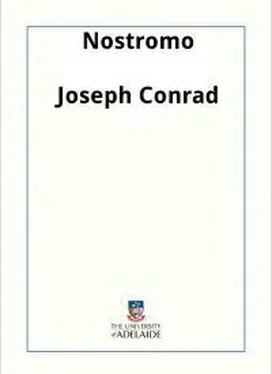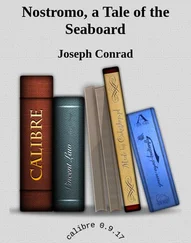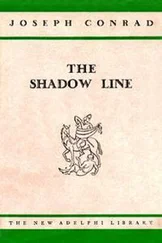Джозеф Конрад - Nostromo - A Tale of the Seaboard
Здесь есть возможность читать онлайн «Джозеф Конрад - Nostromo - A Tale of the Seaboard» весь текст электронной книги совершенно бесплатно (целиком полную версию без сокращений). В некоторых случаях можно слушать аудио, скачать через торрент в формате fb2 и присутствует краткое содержание. Год выпуска: 2006, Жанр: Классическая проза, на английском языке. Описание произведения, (предисловие) а так же отзывы посетителей доступны на портале библиотеки ЛибКат.
- Название:Nostromo: A Tale of the Seaboard
- Автор:
- Жанр:
- Год:2006
- ISBN:нет данных
- Рейтинг книги:4 / 5. Голосов: 1
-
Избранное:Добавить в избранное
- Отзывы:
-
Ваша оценка:
- 80
- 1
- 2
- 3
- 4
- 5
Nostromo: A Tale of the Seaboard: краткое содержание, описание и аннотация
Предлагаем к чтению аннотацию, описание, краткое содержание или предисловие (зависит от того, что написал сам автор книги «Nostromo: A Tale of the Seaboard»). Если вы не нашли необходимую информацию о книге — напишите в комментариях, мы постараемся отыскать её.
Nostromo: A Tale of the Seaboard — читать онлайн бесплатно полную книгу (весь текст) целиком
Ниже представлен текст книги, разбитый по страницам. Система сохранения места последней прочитанной страницы, позволяет с удобством читать онлайн бесплатно книгу «Nostromo: A Tale of the Seaboard», без необходимости каждый раз заново искать на чём Вы остановились. Поставьте закладку, и сможете в любой момент перейти на страницу, на которой закончили чтение.
Интервал:
Закладка:
“I’ve made my career—as you see,” said the Inspector-General of State Hospitals, taking up lightly the lapels of his superfine black coat. The doctor’s self-respect marked inwardly by the almost complete disappearance from his dreams of Father Beron appeared visibly in what, by contrast with former carelessness, seemed an immoderate cult of personal appearance. Carried out within severe limits of form and colour, and in perpetual freshness, this change of apparel gave to Dr. Monygham an air at the same time professional and festive; while his gait and the unchanged crabbed character of his face acquired from it a startling force of incongruity.
“Yes,” he went on. “We all had our rewards—the engineer-in-chief, Captain Mitchell——”
“We saw him,” interrupted Mrs. Gould, in her charming voice. “The poor dear man came up from the country on purpose to call on us in our hotel in London. He comported himself with great dignity, but I fancy he regrets Sulaco. He rambled feebly about ‘historical events’ till I felt I could have a cry.”
“H’m,” grunted the doctor; “getting old, I suppose. Even Nostromo is getting older—though he is not changed. And, speaking of that fellow, I wanted to tell you something——”
For some time the house had been full of murmurs, of agitation. Suddenly the two gardeners, busy with rose trees at the side of the garden arch, fell upon their knees with bowed heads on the passage of Antonia Avellanos, who appeared walking beside her uncle.
Invested with the red hat after a short visit to Rome, where he had been invited by the Propaganda, Father Corbelan, missionary to the wild Indians, conspirator, friend and patron of Hernandez the robber, advanced with big, slow strides, gaunt and leaning forward, with his powerful hands clasped behind his back. The first Cardinal-Archbishop of Sulaco had preserved his fanatical and morose air; the aspect of a chaplain of bandits. It was believed that his unexpected elevation to the purple was a counter-move to the Protestant invasion of Sulaco organized by the Holroyd Missionary Fund. Antonia, the beauty of her face as if a little blurred, her figure slightly fuller, advanced with her light walk and her high serenity, smiling from a distance at Mrs. Gould. She had brought her uncle over to see dear Emilia, without ceremony, just for a moment before the siesta.
When all were seated again, Dr. Monygham, who had come to dislike heartily everybody who approached Mrs. Gould with any intimacy, kept aside, pretending to be lost in profound meditation. A louder phrase of Antonia made him lift his head.
“How can we abandon, groaning under oppression, those who have been our countrymen only a few years ago, who are our countrymen now?” Miss Avellanos was saying. “How can we remain blind, and deaf without pity to the cruel wrongs suffered by our brothers? There is a remedy.”
“Annex the rest of Costaguana to the order and prosperity of Sulaco,” snapped the doctor. “There is no other remedy.”
“I am convinced, senor doctor,” Antonia said, with the earnest calm of invincible resolution, “that this was from the first poor Martin’s intention.”
“Yes, but the material interests will not let you jeopardize their development for a mere idea of pity and justice,” the doctor muttered grumpily. “And it is just as well perhaps.”
The Cardinal-Archbishop straightened up his gaunt, bony frame.
“We have worked for them; we have made them, these material interests of the foreigners,” the last of the Corbelans uttered in a deep, denunciatory tone.
“And without them you are nothing,” cried the doctor from the distance. “They will not let you.”
“Let them beware, then, lest the people, prevented from their aspirations, should rise and claim their share of the wealth and their share of the power,” the popular Cardinal-Archbishop of Sulaco declared, significantly, menacingly.
A silence ensued, during which his Eminence stared, frowning at the ground, and Antonia, graceful and rigid in her chair, breathed calmly in the strength of her convictions. Then the conversation took a social turn, touching on the visit of the Goulds to Europe. The Cardinal-Archbishop, when in Rome, had suffered from neuralgia in the head all the time. It was the climate—the bad air.
When uncle and niece had gone away, with the servants again falling on their knees, and the old porter, who had known Henry Gould, almost totally blind and impotent now, creeping up to kiss his Eminence’s extended hand, Dr. Monygham, looking after them, pronounced the one word—
“Incorrigible!”
Mrs. Gould, with a look upwards, dropped wearily on her lap her white hands flashing with the gold and stones of many rings.
“Conspiring. Yes!” said the doctor. “The last of the Avellanos and the last of the Corbelans are conspiring with the refugees from Sta. Marta that flock here after every revolution. The Cafe Lambroso at the corner of the Plaza is full of them; you can hear their chatter across the street like the noise of a parrot-house. They are conspiring for the invasion of Costaguana. And do you know where they go for strength, for the necessary force? To the secret societies amongst immigrants and natives, where Nostromo—I should say Captain Fidanza—is the great man. What gives him that position? Who can say? Genius? He has genius. He is greater with the populace than ever he was before. It is as if he had some secret power; some mysterious means to keep up his influence. He holds conferences with the Archbishop, as in those old days which you and I remember. Barrios is useless. But for a military head they have the pious Hernandez. And they may raise the country with the new cry of the wealth for the people.”
“Will there be never any peace? Will there be no rest?” Mrs. Gould whispered. “I thought that we——”
“No!” interrupted the doctor. “There is no peace and no rest in the development of material interests. They have their law, and their justice. But it is founded on expediency, and is inhuman; it is without rectitude, without the continuity and the force that can be found only in a moral principle. Mrs. Gould, the time approaches when all that the Gould Concession stands for shall weigh as heavily upon the people as the barbarism, cruelty, and misrule of a few years back.”
“How can you say that, Dr. Monygham?” she cried out, as if hurt in the most sensitive place of her soul.
“I can say what is true,” the doctor insisted, obstinately. “It’ll weigh as heavily, and provoke resentment, bloodshed, and vengeance, because the men have grown different. Do you think that now the mine would march upon the town to save their Senor Administrador? Do you think that?”
She pressed the backs of her entwined hands on her eyes and murmured hopelessly—
“Is it this we have worked for, then?”
The doctor lowered his head. He could follow her silent thought. Was it for this that her life had been robbed of all the intimate felicities of daily affection which her tenderness needed as the human body needs air to breathe? And the doctor, indignant with Charles Gould’s blindness, hastened to change the conversation.
“It is about Nostromo that I wanted to talk to you. Ah! that fellow has some continuity and force. Nothing will put an end to him. But never mind that. There’s something inexplicable going on—or perhaps only too easy to explain. You know, Linda is practically the lighthouse keeper of the Great Isabel light. The Garibaldino is too old now. His part is to clean the lamps and to cook in the house; but he can’t get up the stairs any longer. The black-eyed Linda sleeps all day and watches the light all night. Not all day, though. She is up towards five in the afternoon, when our Nostromo, whenever he is in harbour with his schooner, comes out on his courting visit, pulling in a small boat.”
Читать дальшеИнтервал:
Закладка:
Похожие книги на «Nostromo: A Tale of the Seaboard»
Представляем Вашему вниманию похожие книги на «Nostromo: A Tale of the Seaboard» списком для выбора. Мы отобрали схожую по названию и смыслу литературу в надежде предоставить читателям больше вариантов отыскать новые, интересные, ещё непрочитанные произведения.
Обсуждение, отзывы о книге «Nostromo: A Tale of the Seaboard» и просто собственные мнения читателей. Оставьте ваши комментарии, напишите, что Вы думаете о произведении, его смысле или главных героях. Укажите что конкретно понравилось, а что нет, и почему Вы так считаете.












